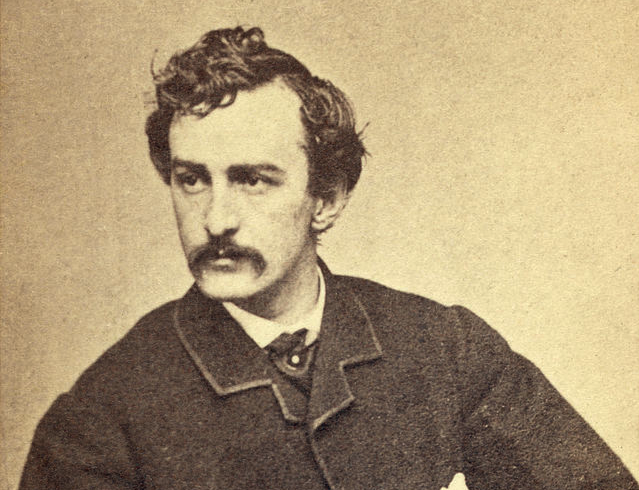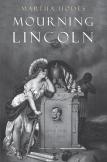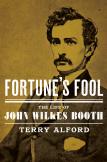A Mortal Wound: Marking 150 years since the assassination of Abraham Lincoln
With the coming of April 2015, the sesquicentennial of the Civil War draws to a close, giving ample cause to look back on one of the most cataclysmic months in the nation’s history. It is now hard to imagine the surge of contrasting emotions that Americans felt, first on April 9, 1865, when General Lee surrendered at Appomattox, and then only six days later, when the news came that President Lincoln had been murdered at Ford’s Theater. Two admirably researched books strive, in very different ways, to bring us closer to the latter moment: Fortune’s Fool: The Life of John Wilkes Booth, by Terry Alford; and Mourning Lincoln, by Martha Hodes. How one judges their relative success depends greatly on what one deems to be the goals and purposes of historical writing.
John Wilkes Booth, the murderer of Abraham Lincoln, died at the age of 26. Terry Alford, the assassin’s latest biographer, researched his subject for approximately as long. Fortune’s Fool is the result of his more than a quarter century of effort, and it epitomizes both the blessings and the curses that are likely to arise when an author spends so much time immersed in a single subject. Both Alford’s dedication and his fine research are made the more remarkable by the fact that he teaches at a community college. Perhaps only those who have toiled at such a position can fully appreciate the impediments that Alford almost certainly confronted as he strove to write his biography. His perseverance is to be admired.
Admirable as well are the many things that Fortune’s Fool does right. In telling a story like Booth’s, in which so much of the significance is compressed into the final weeks, one risks having the entire narrative dominated by its climactic episodes. Alford avoids the trap. While one is not surprised to find Booth’s plotting against Lincoln taking up approximately half the volume, one still has the satisfied sense of having been shown a full, if foreshortened, life. The assassin’s youth is rendered in fascinating detail, and Alford’s treatment of life in the mid-19-century theater is a treat. To his further credit, Alford does not present the entire life as a prologue to a foreordained conclusion. Booth had no designs to kidnap Lincoln until the late summer of 1864 and no clear, focused intent to kill him until March 1865. Resisting the temptation to foreshadow, Alford lets his subject’s intentions evolve as they evidently did: gradually pursuing their own peculiar logic, with few alarm bells or signposts.
The less happy outcome of Alford’s long pursuit of Booth is that he has fallen victim to his subject’s fateful, manipulative charisma. In researching his book, Alford has determined, not too surprisingly, that his subject was not a thoroughly damnable character all the time. Booth, we discover, was fond of children (he once warmly greeted Tad Lincoln backstage) and won many loyal friends with his magnetic charm. Fair enough, but Alford takes a further perilous step. In his evident admiration of the actor, Alford struggles to gainsay criticisms of Booth that seem beyond serious argument. The stretches become too great, and, instead of vindicating Booth, Alford’s portrait crumbles into incoherence. Alford submits, for instance, that Booth “was not unduly egotistical.” He later asserts, however, that Booth’s murder of Lincoln resulted in part from “a longing for renown.” Alford is staunch in his surprising claim that “whatever his faults, [Booth] was no coward.” A definition of cowardice that excludes a man who shoots a defenseless victim in the back of the head, in the presence of the latter’s wife, must be a very careful one. But Alford’s specific resistance to the idea of Booth as coward concerns his subject’s decision not to join the Confederate army, whose objectives he passionately supported. Alford elaborately explains that Booth eschewed military service so as not to deprive his emotionally fragile mother of his care and company. Three pages later, though, Booth is off to St. Louis for an acting engagement, and Mrs. Booth does not follow.
Admittedly, human nature is inconsistent, and any worthy biographer must deal with contradictions. But biography at its best synthesizes those contradictions into believable, albeit complex portraits. Alford’s Booth finally does not cohere. Indeed, after hearing Alford’s expatiations on Booth’s general kindness, fun-loving nature and “heroic impulses,” one nearly forgets that the charming fellow drank prodigiously, consorted with teenage prostitutes and, oh yes, killed the president.
The last three words of Alford’s book are “embraced and forgiven.” Many have written on Booth. Alford is the first to suggest that he needs a hug. Fortune’s Fool shows eloquently that history is more than the recovery of facts. Good history understands the impact of events as they were felt at the time. To urge forgiveness for John Wilkes Booth is not to engage in history but to demand a willful forgetting of history and of the harm and horror created by an unrepentant criminal. For all its superb research, Fortune’s Fool is finally as misguided and creepy as its subject.
To understand what Lincoln’s murder meant to those living at the time, one need go no farther than Martha Hodes’s superb Mourning Lincoln. Interestingly, Mourning Lincoln is in a sense a 9/11 book. Hodes, a New York University professor who saw the second plane hit the towers, was prompted by that tragedy’s aftermath to wonder how Americans reacted to another communally experienced moment of dread. Looking beyond the daily papers, Hodes consulted thousands of letters and diaries to unearth a dazzling array of responses—from the shock of proper New Englanders to the glee of a Florida lawyer who blamed “Lincon,” as he intentionally misspelled the name, for his personal impoverishment and for the death of his beloved slaveholding culture.
A wiser book than Fortune’s Fool, Hodes’s volume is also immeasurably sadder. It explores not only the devastating grief that swept over Lincoln’s supporters but also the fear of reprisal among Southerners still reeling from Lee’s surrender—Southerners who decked their homes in mourning not from sorrow but from fear lest they be seen as disloyal to the president’s memory. In Hodes’s account, one also feels vividly the fearful uncertainty of newly freed blacks. Would the death of Father Abraham signal a return to slavery? One sees with equal clarity the devastation of the southern landscape as diarists across the defeated Confederacy survey their ruined lives and blankly try to envision a future under Reconstruction.
An elegant feature of Mourning Lincoln’s structure is Hodes’s inclusion of short intercalary vignettes between chapters, treating subjects as varied as children’s responses, the taking of relics of the assassination and diarists’ thoughts about the woman then universally known as “poor Mrs. Lincoln.” Perhaps the finest touch of Hodes’s volume is its awareness of how life went on in the midst of sorrow. Although some felt as if the assassin’s bullet had stopped time, others knew their daily work simply must continue. One Massachusetts diarist wrote, “Funeral of president Lincoln—put out fire in the woods,” and never mentioned the president again.










